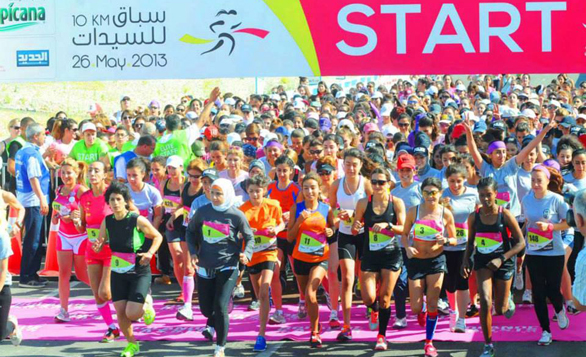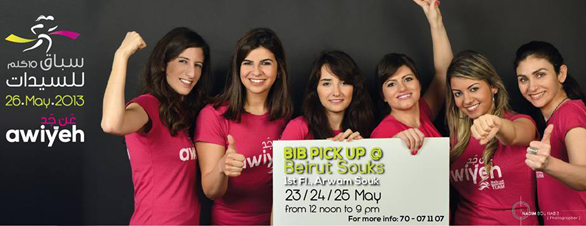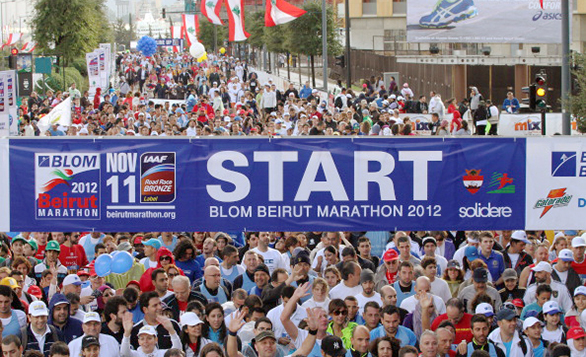
This weekend, the Beirut Marathon hosted its first-ever all-female event. Many runners wore pink. Photo: courtesy of the Beirut Marathon
On Sunday, May 26, two rockets soared over Beirut, Lebanon, hitting a Shi’ite Muslim area in the southern part of the city. The rockets raised fears that Beirut could become embroiled in the civil war raging in nearby Syria. And yet, these bombs did not stop women throughout the city from lacing up their running sneakers and taking to the streets to run their hearts out. May 26 was also the day of the Beirut Marathon’s first all-female event, the 10K Women’s Challenge. About four thousand woman participated, even as news of the bombing spread.
The Beirut Marathon was founded by May El-Khalil, who will speak at TEDGlobal 2013 on June 12 during the session “World on Its Head.” With the 10K Challenge shining a spotlight on the courage and strength of Beirut’s women, and with so many questions still out there about why two bombers targeted the finish line of the Boston Marathon in April, the TED Blog wanted to ask El-Khalil a few questions about the meaning of marathons.
First, I’m curious — how did you discover your love of running?
Ever since I was young, I always felt that I had an excess of energy within me. I was a nature lover as well, so I started running in the outdoors. When I moved to Nigeria after getting married, my enthusiasm for exercise and fitness went with me and I became an aerobics instructor — but still liked running the best. I used to run around our neighborhood, and it helped me better understand and connect to living in Lagos. Sometimes, the children of street vendors would accompany me for a few kilometers. Running has been with me from my youth.
You founded the Beirut marathon in 2003 to bridge sectarianism in Lebanon. What is the symbolism of marathons?
I think that, at its core, a marathon symbolizes endurance and commitment. A marathon is something that people aspire to achieve; it is a high goal that once reached can change a person’s life forever. It’s a long-distance race that not only requires physical fitness, but mental fitness as well. People who run marathons are an elite type of athlete. They are the ones who can overcome obstacles and go all the way. International marathons are the gathering places for distance-running enthusiasts from all corners of the world and from all walks of life — they compete against themselves first and foremost, and against each other for the glory of the win. The Beirut International Marathon is one of those events that embodies the spirit of perseverance and stamina, in that it takes place in a city that has itself been able to keep running and survive in spite of all types of calamities. It is a marathon that really showcases the stamina and the thirst for life of the Lebanese people — and their willingness to move forward even when all around them is falling apart.
This is something I found myself asking a lot after the bombing that occurred during the Boston Marathon—why target that specific event?
They were trying to directly injure the human spirit. When we heard about the Boston Marathon, we immediately sent them a letter of support — in solidarity with their race, their team and the people of Boston. It was a horrible act of violence, but as we have seen, Boston — as well as Beirut — stands resilient. No one can break our spirit.
On the morning [of the 10K Women’s Challenge], we woke up to the news that rockets had been fired into a suburb of Beirut. Despite all that, four thousand women showed up to run. We even had a group of women come all the way down from Tripoli, a city in the north of Lebanon, where there is currently heavy fighting and gunfire. I was so inspired by their determination.

A promo shot for the Beirut Marathon’s 10K Women’s Challenge. Photo: courtesy of the Beirut marathon
Tell us more about the 10K Women’s Challenge. How did it go?
The energy of the day was truly inspirational. A great success on all levels. Women from all ages and all walks of life came together with joy to do what women do most: bring life forward. The atmosphere was festive and strong at the same time, and the city streets filled with determined women running each for her own reason. Some ran for fitness, some for fun, some for causes, some for the challenge itself. The men also had a very strong presence as supporters and cheerleaders. It was an image of the beautiful world we wish we could create every day — of women feeling empowered and happy and of men feeling supportive and positive.
What felt different about having all women in the race?
The feel of an all-women’s race is different! The female energy is exuberant, beautiful, joyful. Cooperation among women is more prevalent than competition, and this was obvious in this race. The ladies came together for their causes and for charities, to help others and to improve their own living conditions. Having a race exclusive to women is never organized with the intent of marginalizing men, but to give women a space to inspire and encourage each other to reach goals.
A few women really inspired me on race day. There is a lady who participates in all of our races to push her quadriplegic son who enjoys racing. There are the two participants Rita and Lilian — one is blind and one is paralyzed — and they run together as a team, as each other’s eyes and legs. Also, Lebanese journalist and television news anchor May Chidiac survived an assassination attempt that took her hand and part of her leg, and she showed up to support other survivors and run the 5K course in her wheelchair. There is also the Ethiopian domestic worker who trains in her spare time and who managed to win third place overall in the 10K run. Last but not least, I was impressed that the Lebanese First Lady, Mrs. Wafaa Suleiman, got so excited about the race that she actually participated in the 5K run.
Make sure to see May El-Khalil’s talk during TEDGlobal 2013, taking place June 10-14 in Edinburgh, Scotland. Check out information about attending or watching from home with TED Live »
And stay tuned to the TED Blog, where we’ll be covering the conference live, and running articles about each talk about an hour after they are given.

Participants gather for the start of the 2012 Beirut Marathon Photo: Anwar Amro/AFP/Getty Images
Comments (17)
Pingback: Women Value Communities Formed through Running and More
Pingback: How marathons can heal communities: 5 incredible stories | Best Science News
Pingback: How marathons can heal communities: 5 incredible stories | BizBox B2B Social Site
Pingback: How marathons can heal communities: 5 incredible stories | Krantenkoppen Tech
Pingback: 2014 VIRGINIA HALF MARATHONS
Pingback: 2014 MARATHONS IN UTAH
Pingback: MARATHONS EUROPE 2014
Pingback: 2014 MARATHON LIST USA News
Pingback: 2014 MARINE CORPS MARATHON News
Pingback: 2014 BOSTON MARATHON QUALIFYING TIMES
Pingback: 2014 MARATHON TURKEY
Pingback: 2014 MARATHON ROME
Pingback: 2014 MODESTO MARATHON
Pingback: 2014 MARATHON RUNS Tips
Pingback: 2014 RESULTS BOSTON MARATHON